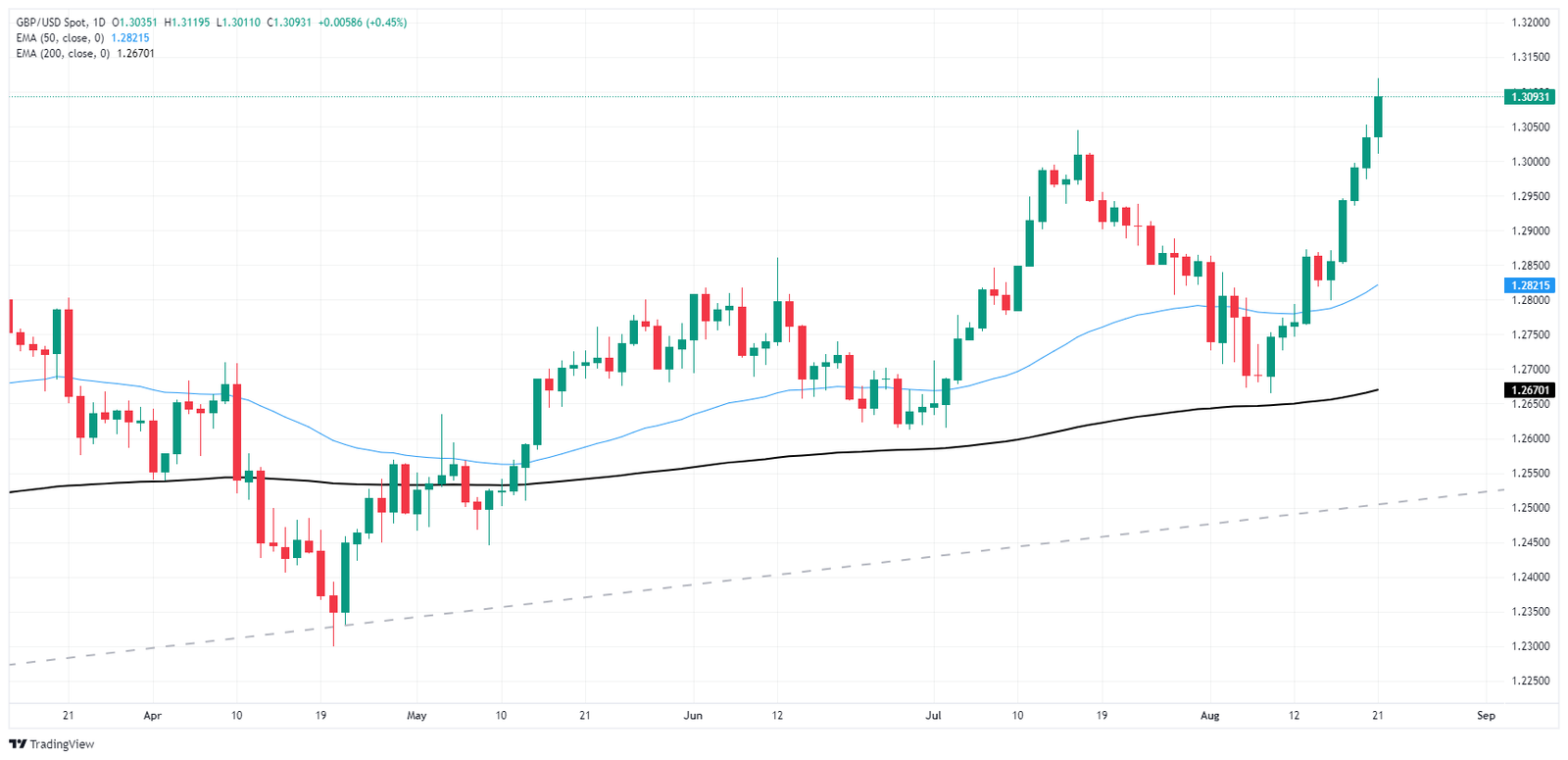- GBP/USD breached 1.3100 on Wednesday as the bull march continues.
- The Pound Sterling is enjoying a healthy bid as the US Dollar recedes.
- Jackson Hole, PMI data dump still loom ahead.
GBP/USD briefly tested chart paper on the high side of 1.3100 on Wednesday as Cable continues to push deeper into bull country. The pair is marching into fresh 13-month highs, setting a peak intraday bid of 1.3112, and the Sterling is threatening to cross into its highest prices against the Greenback since April of 2022.
The US Bureau of Labor Statistics announced a steep cut of over 800K jobs to March’s Nonfarm Payrolls (NFP) jobs print, sharply revising previous job growth figures to the low side. The tilt in hiring numbers prompted markets to add to bets of a double cut from the Federal Reserve (Fed) in September. Rate cut bets pinned even higher on Wednesday after the Fed’s latest Meeting Minutes revealed policymakers in the US central bank had already begun discussions about when to begin cutting interest rates as early as July.
UK Purchasing Managers Index (PMI) figures for August are expected to drift upwards slightly on Thursday, with the UK Services PMI component forecast to tick up to 52.8 from 52.5. The Manufacturing section is expected to hold steady at 52.1.
US PMI business activity survey results are also slated for release on Thursday, as well as the kickoff of the annual Jackson Hole Symposium which is set to run through the weekend. Wednesday will deliver the Federal Reserve’s (Fed) latest Meeting Minutes, but market forces will broadly be looking ahead to Thursday’s outings for reasons to move.
US S&P Global Manufacturing PMI activity expectations are forecast to hold steady at 49.6 in August, while the Services PMI component is expected to tick down a full point to 54.0 from 55.0. The kickoff of the Jackson Hole Symposium is expected to draw plenty of investor attention on Thursday, but Friday’s appearance from Fed Chairman Jerome Powell can be expected to set the overall tone of market sentiment heading into next week.
GBP/USD technical outlook
With Cable chalking in a fifth straight gain, GBP/USD is poised for a breach into multi-year highs, provided buyers can maintain pressure long enough to keep prices climbing beyond 2023’s July peak of 1.3142. Odds favor the buyers as GBP/USD has closed in the green for all but one of the last ten consecutive trading days.
GBP/USD daily chart
Pound Sterling FAQs
The Pound Sterling (GBP) is the oldest currency in the world (886 AD) and the official currency of the United Kingdom. It is the fourth most traded unit for foreign exchange (FX) in the world, accounting for 12% of all transactions, averaging $630 billion a day, according to 2022 data. Its key trading pairs are GBP/USD, aka ‘Cable’, which accounts for 11% of FX, GBP/JPY, or the ‘Dragon’ as it is known by traders (3%), and EUR/GBP (2%). The Pound Sterling is issued by the Bank of England (BoE).
The single most important factor influencing the value of the Pound Sterling is monetary policy decided by the Bank of England. The BoE bases its decisions on whether it has achieved its primary goal of “price stability” – a steady inflation rate of around 2%. Its primary tool for achieving this is the adjustment of interest rates. When inflation is too high, the BoE will try to rein it in by raising interest rates, making it more expensive for people and businesses to access credit. This is generally positive for GBP, as higher interest rates make the UK a more attractive place for global investors to park their money. When inflation falls too low it is a sign economic growth is slowing. In this scenario, the BoE will consider lowering interest rates to cheapen credit so businesses will borrow more to invest in growth-generating projects.
Data releases gauge the health of the economy and can impact the value of the Pound Sterling. Indicators such as GDP, Manufacturing and Services PMIs, and employment can all influence the direction of the GBP. A strong economy is good for Sterling. Not only does it attract more foreign investment but it may encourage the BoE to put up interest rates, which will directly strengthen GBP. Otherwise, if economic data is weak, the Pound Sterling is likely to fall.
Another significant data release for the Pound Sterling is the Trade Balance. This indicator measures the difference between what a country earns from its exports and what it spends on imports over a given period. If a country produces highly sought-after exports, its currency will benefit purely from the extra demand created from foreign buyers seeking to purchase these goods. Therefore, a positive net Trade Balance strengthens a currency and vice versa for a negative balance.















